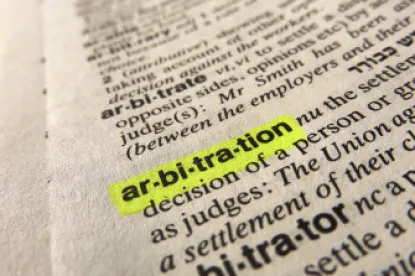On May 21, 2018, the Supreme Court ruled in Epic Systems Corp. v. Lewis that employees can agree to: (1) arbitrate employment disputes; and (2) waive their right to resolve those disputes through class and collective actions. The decision represents a victory for employers and may limit an employer’s financial exposure in employment disputes. Despite the potential benefits that come with arbitration of employment claims on an individual basis, employers should carefully consider whether arbitration agreements make sense for their workforce.
Background
In Epic Systems Corp., Epic Systems required its employees to sign an arbitration agreement that included a class and collective action waiver. Employees who signed the agreement thus agreed to resolve their employment disputes through individual arbitration and also waived their right to participate in or receive benefits from any class, collective or representative proceedings.
An Epic employee, Jacob Lewis, signed such an agreement with Epic. After his employment ended and despite the agreement, Lewis filed class and collective actions against Epic, claiming that he and other Epic employees had been denied overtime wages in violation of the Fair Labor Standards Act (FLSA) and Wisconsin wage and hour laws.
Epic moved to dismiss the claim and to compel arbitration, citing the arbitration and class waiver agreement. The district court denied Epic’s motions, stating that the waiver was unenforceable because it interfered with employees’ right to engage in “concerted activities” for “mutual aid or protection” under the National Labor Relations Act (NLRA).
The Seventh Circuit Court of Appeals agreed with the district court, becoming the first appellate court to agree with the National Labor Relations Board’s (NLRB) 2012 position in D.R. Horton that such waivers were unenforceable. As a result, employers in Wisconsin, Indiana and Illinois have been bound by this ruling since 2016.
The Decision
In a 5-4 opinion authored by Justice Neil Gorsuch, the Supreme Court overturned the Seventh Circuit and ruled the NLRA did not grant employees a right to pursue their claims through a class or collective action, nor did the waiver of class rights violate any provision of the NLRA. According to the Court, the NLRA does not address class or collective action issues. Instead, the NLRA focuses on collective bargaining issues. The Court further stated that the Federal Arbitration Act compelled upholding the parties’ right to enter into agreements to arbitrate their wage and hour claims.
The Epic decision upholds an employee’s ability to waive his or her right to seek damages through class and collective actions. The Supreme Court majority has also signaled a broader approval of arbitration agreements covering employment claims within and outside of the wage and hour context.
Impact On Employers
For employers who do not currently use arbitration or alternative dispute resolution agreements, the Epic decision provides an opportunity to implement them. Employers should weigh the benefits of mandatory arbitration and class and collective action waivers against the costs and challenges associated with proceeding in such a forum. For example, employers will need to consider which procedures will govern the arbitration, where the arbitration will take place, how discovery will be handled, the fees and costs associated with arbitration (and who bears such costs), and similar issues.
Employers who already use arbitration agreements with their employees should consult with legal counsel to ensure those agreements meet their needs and preferred outcomes. While the Epic decision gives employers certainty that they can use arbitration agreements with class action waivers as a tool to minimize financial exposure, such agreements must nevertheless be well-drafted to withstand potential challenges from plaintiffs’ counsel related to the underlying enforceability of the contract. Some plaintiffs’ attorneys have also resorted to filing multiple single arbitration claims, which can have the effect of driving up costs and disruption for employers and can lead to differing results for similarly-situated employees.
In addition, policymakers at the federal and state levels have introduced legislation to limit an employer’s ability to require arbitration in cases where an employee has alleged sexual harassment. Aside from the potential legal issues, employers should also consider the public relations issues associated with requiring employees to sign arbitration agreements with class waivers.
Because the landscape of arbitration will continue to evolve, employers should consult with legal counsel to discuss their options and obligations before making changes to existing agreements, relying on arbitration agreements going forward or implementing new agreements.




 />i
/>i
